“My God, the kid was right. The killer is the tire.” — Stephen Spinella as Lieutenant Chad in Rubber
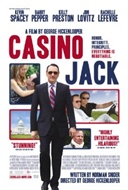 |
Casino Jack (2010) I watched the straight documentary, Casino Jack and the United States of Money, a couple of months ago (you can read my review here). The documentary is an interesting contrast with this dramatization, also titled Casino Jack. The documentary detailed the crooked playing-one-side-against-the-other lobbying, influence peddling, and gambling enterprises of Jack Abramoff; the dramatization tries to tell us something about Abramoff himself: his human side, his motivations. Kevin Spacey doesn’t try to play Abramoff as a sympathetic character, but he does play him as a fellow human being, and that’s more than I thought anyone could do with such a sleazy specimen. I can’t imagine too many people want to watch a movie that brings back memories about the rampant corruption of the Bush years, and so it was a good move on the part of the producers to hire Kevin Spacey to play the role of the most flamboyantly corrupt Bushie of all. Spacey gives it his all, and it is a marvel to see. If the subject weren’t so inherently depressing, this movie would actually be a lot of laughs … oh, hell, I’ll just admit it … it is a lot of laughs! |
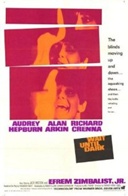 |
Wait Until Dark (1967) I thought we’d enjoy watching some older movies, so I ordered Wait Until Dark, filmed in 1967 with Audrey Hepburn. My wife had seen it but I hadn’t. Time tells in some ways: the scriptwriters go out of their way to explain things that are perfectly obvious to the audience (example: having Audrey announce to her husband on the telephone that she’s just come home from “blind school” when we’ve just seen her walk into her apartment with a white cane and start feeling her way around); a certain degree of hammy overacting (Audrey bugging her eyes out when she hears Alan Arkin’s squeaky shoe the second time); the absence of guns and foul words (even on the part of the bad guys). The story, though, is scary and suspenseful, and it’s a great movie to watch. I only wish Alfred Hitchcock had directed it … then, at least, we wouldn’t have had all that hammy overacting! |
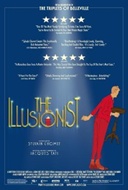 |
The Illusionist (2010) People praise this animated movie, and indeed it has won several prizes in addition to being an Oscar nominee, but I thought it was a shallow exercise in sentimentality. My wife’s reaction was more pithy: she thought it “artsy-fartsy.” I did like the artwork: the Scottish backdrops, the city of Edinburgh, the interesting faces of the characters. I liked the tribute to the French actor/director Jacques Tati, although to be fair the movie is based on a Jacques Tati script, so no wonder. But the sentimentality? It was broad and crude enough to be slapstick. Based on the hype and all the awards, I expected much more. |
 |
Home (2008) The home of an isolated French family, some miles from the closest city or town and surrounded by farm fields, is situated right on the edge of a four-lane express highway that had been built 10 years previously but never opened. The family parks their car on the deserted roadway, which they treat as part of their yard. Everyone … mom & pop, two teenaged daughters, one young son … is happy. Then the road opens and the family is driven slowly insane. At this point the movie becomes an extended metaphor, and I kept thinking of Captain Ahab. Regaining their former isolation, finding peace and quiet, getting away from the sight, smell, and constant sound of incessant traffic (which is almost literally in their living room) … these become their white whale. The basic situation, that a house would be allowed to remain situated right on the edge of a major roadway in a 1st-world country like France, is not strictly believable, but the family, and their reaction to this incredibly stressful event, is. Parts of the movie are wrenchingly tense, particularly toward the end when the family is falling apart, but underneath it all there’s a sense of humor at work. I quite liked it and would watch it again, just to look for subtleties I undoubtedly missed the first time around. |
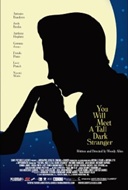 |
You Will Meet a Tall Dark Stranger (2010) I quite like Woody Allen’s films, especially of late. This one doesn’t stand up to the brilliant Vicky Christina Barcelona, but is quite rewarding in its own right, with sumptuous photography, great music, excellent pacing and acting, and sympathetic characters — by which I mean characters you can relate to and understand as fellow humans. Allen’s women, as always, are very well developed. Even though you sense disaster looming as different plot threads unfold, you’re still shocked with disaster strikes, and that’s good story-telling. Twice, once at the beginning and once at the end, the voice-over narrator tells us that life is full of sound and fury, signifying nothing, and that perhaps is an appropriate thing to say at the ending, when the story suddenly stops, threads hanging everywhere. I expect the film’s abrupt ending will upset a lot of viewers, and even turn some off. Myself, I’ll forgive, and I’ll be back for the next Woody Allen film. |
 |
Buried (2010) Half a star isn’t fair. It’s certainly a three-star story, quite suspenseful in its way, and the acting … well, all the acting Ryan Reynolds can do lying on his back inside a dark coffin for 95 minutes … is surely superb, but the movie is unwatchable, and that is what I want to indicate by the half-star rating. I mean, get this: the movie opens in pitch blackness. After a minute, you hear someone breathing, coughing, making mumbling noises. It’s Paul Conroy, a US contractor in Iraq, coming awake inside a buried coffin. He has a Zippo lighter and a cell phone with half a charge. Over the next hour and a half, Paul periodically burns his lighter and makes cell phone calls in an effort to get someone, anyone, to come looking for him. All the action takes place inside the coffin, and all you ever see are brief glimpses of Paul’s face in the glow from his lighter and cell phone. And then he dies. I don’t care how good the story is or how good the acting is, I don’t want to spend 95 minutes in a coffin with anybody. Why not just watch a loved one die of cancer, or hold a puppy as it breathes its last? What is the point of this movie? To induce mass audience suicide? Do not rent this DVD. Just don’t, not even as a joke. |
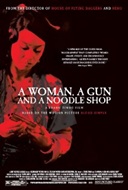 |
A Woman, a Gun, and a Noodle Shop (2009) I was very pleasantly surprised with this Chinese remake of the Coen Brothers’ Blood Simple. A sort of spaghetti western that also reminded me of those wonderful Clint Eastwood movies, it’s slapstick in parts, martial artsy in parts, otherworldly in parts, photographed beautifully in all parts … and it works. I would watch this again, and if you know me, that’s a pretty strong endorsement. |
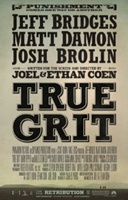 |
True Grit (2010) I read Charles Portis’ True Grit a few months ago (my book review is here). Everyone was talking about this new Coen Brothers film, which I knew I wouldn’t be able to rent from Netflix for some time, and I wanted to bone up on the story. Sure, I’d seen the old John Wayne movie, but knowing Hollywood, suspected (rightly, as it turned out) that it didn’t bear much relation to the book. The new True Grit is the book. It looks, sounds, and feels just as I imagined it when I read the novel. I mean exactly, and that is a revelation — I can think of only a few movies so faithful to their source, and in this case that’s a great virtue. It’s a hell of a story, tough and hard yet wry and witty. The characters are one of a kind; a word like “memorable” falls far short of the job. Portis is a genius; the Coen Brothers, geniuses themselves, nail it here. Now that I’ve seen the movie — the earlier version doesn’t even count, it’s so far off — I’m more convinced than ever that Jeff Bridges and Hailee Steinfeld were robbed at the Oscars. |
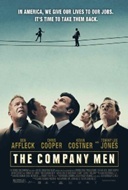 |
The Company Men (2010) Good but not great, probably because the subject matter is so damn depressing. It’s hard to generate much sympathy for Ben Affleck’s character, especially since he’s so slow to see what his wife immediately and clearly sees, and it’s painful to watch him squander his severance pay on maintaining the “successful man” image. I was far more sympathetic to Tommy Lee Jones’ character, who handled his firing with aplomb and grace. But a whole movie about people getting laid off? Too close to home for most of us. And the happy Hollywood ending didn’t fool me, not even a little bit. |
 |
Rubber (2010) A spoofish campy faux-horror movie-within-a-movie-about-a-movie. It’s not at all self-conscious about itself, which elevates it above other spoofish campy faux-horror movies I’ve seen. Which is all to say I sort of liked it. Some of the movie’s ideas come across as sophomoric, but not insultingly so. My only quibble is Stephen Spinella’s long rant about movies being full of things that happen for “no reason.” In the rant he cites several examples, and unless I’m missing something, there were reasons for every example he gave (the possible exception being E.T.’s brownish complexion). But hey, I watched Rubber all the way through and had a good time. It’s only fair that I note, however, that it put my spoofish campy faux-horror movie-loving daughter to sleep, so your mileage may vary. |